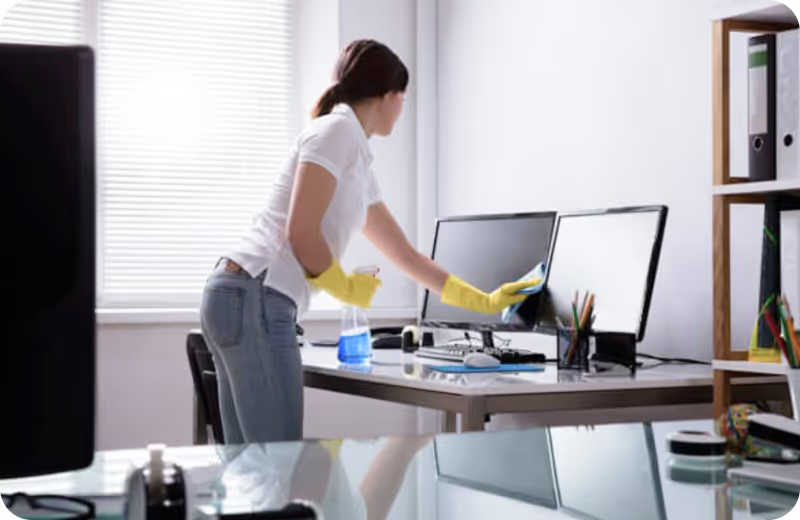
What You'll Need
Those hard water stains build up due to dissolved minerals in water. Once the water evaporates, these mineral deposits leave behind a rough, white mark on the glass surface. Acidic solutions, like lemon juice and white vinegar, dissolve these mineral deposits, and clean cloudy glasses with ease! Here's what you'll need:
- Lemon juice OR
- White vinegar
- Baking soda
- Clean cloth
How to Remove Hard Water Stains from Drinking Glasses: A Step-by-Step Guide
Cleaning Light Stains from Drinking Glasses
Step 1: Apply Acidic Solution
First, apply a lemon juice or vinegar solution directly on the drinking glasses. These acidic solutions work to remove hard water stains by dissolving the hardened mineral deposits on the surface of the glass. Applying a few drops of acidic cleaning solution will clean cloudy glasses without damaging the smooth surface.
We recommend using lemon juice or white vinegar to clean drinking glasses as they are food-safe and accessible kitchen staples. Using acetone and similar solutions may work to remove hard water stains on the outside of the glass, but should never be used on varnished drinkware.
Step 2: Sprinkle Baking Soda
Sprinkle the stains with baking soda. Baking soda provides an abrasive scrubbing power to gently scrub away hard water stains from glasses without scratching the surface of the glass. Fine salt will also work, but baking soda works well with white distilled vinegar. Apply the baking soda in small areas at a time.
Step 3: Scrub in a Circular Motion
Take a clean microfiber cloth, and start scrubbing the baking soda into the hard water stains in a gentle, but firm circular motion. Be careful not to scrub too vigorously as to may shatter or scratch the surface of the glass. If the baking soda feels dry, dip your cloth in some white vinegar, or place your acidic solution in a spray bottle to replenish your cleaning solution.
Step 4: Rinse and Wipe Dry
Rinse the glass, and wipe dry to prevent future hard water stains. If you have a problem with cloudy glasses, you may want to consider using a rinse aid or hard water softener to wash your glassware with soft water instead of hard water, which should prevent hard water stains.
Cleaning Tough Stains from Drinking Glasses
Step 1: Fill a Tub with Acidic Solution
For heavier stains and cloudy glasses, fill a tub with vinegar. The tub should be big enough to submerge the cloudy glass. The vinegar will remove hard water stains from glasses in both the interior and exterior of the glass. You may add baking soda to the solution for tough stains, but this is optional.
Step 2: Let it Soak
Submerge your drinking glasses into the solution, and let it sit for 15 minutes. The solution will seep into stains, removing hard water stains from the glass. This solution also works to remove tea and coffee stains from glass.
Step 3: Wash and Rinse
Wash with a mild and gentle detergent, and rinse with soft water to completely remove the hard water stains. Use a lint-free cloth to dry the glasses without leaving fibers behind, and dry your glasses to prevent hard water stains from forming.
Optional: Scrub with Baking Soda
For even tougher stains, apply baking soda, and scrub the entire glass for 1-2 minutes to polish the surface without damaging the glassy look. Doing so should remove old mineral buildup stuck on the glassware. However, this step is optional for regular stains.
Tips on Maintaining Your Glassware
Glassware can look crisp and fresh when kept pristine, but stains from tea, coffee, wine, and hard water can make those glasses look grimey instead. Here are a few tips to maintain your glassware, and keep them clean:
- Avoid extreme temperature changes in glasses as glass shatters with sudden changes in temperature.
- Wipe and scrub glassware in circular motions to prevent streaks on the surface.
- Use soft water to rinse glassware, and avoid water stains from glasses.
- Avoid piling glassware together with sharp objects as they may get damaged or scratched.
- Wipe glassware dry after dishwashing to prevent water stains from accumulating on the surface of the glass.
Refreshing and Clean!
Keeping your kitchen clean is a good way to make sure your food is sanitary and delicious. At Luce, we take precautions to clean kitchens with only the safest of cleaning solutions and tools. From the kitchen glassware to the glass shower door in the bathroom, our team can get rid of those hard water stains for you with ease!
Contact us through our email or website, and we can schedule you for a cleaning session that fits your lifestyle!





























